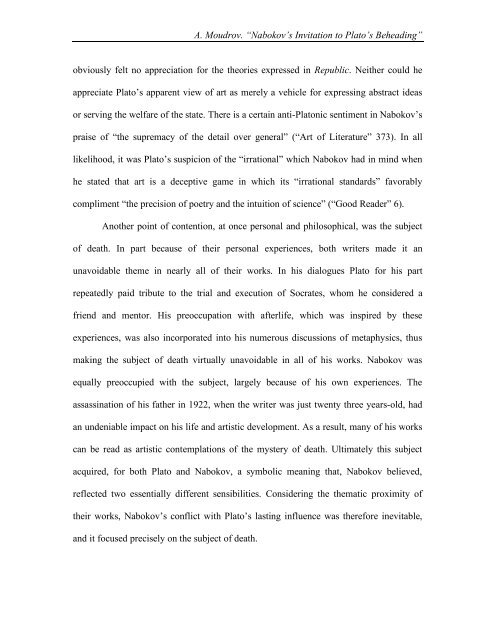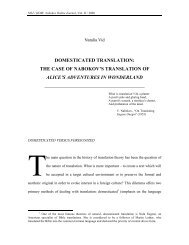Nabokov's Invitation to Plato's Beheading
Nabokov's Invitation to Plato's Beheading
Nabokov's Invitation to Plato's Beheading
- TAGS
- beheading
- etc.dal.ca
Create successful ePaper yourself
Turn your PDF publications into a flip-book with our unique Google optimized e-Paper software.
A. Moudrov. “Nabokov’s <strong>Invitation</strong> <strong>to</strong> Pla<strong>to</strong>’s <strong>Beheading</strong>”<br />
obviously felt no appreciation for the theories expressed in Republic. Neither could he<br />
appreciate Pla<strong>to</strong>’s apparent view of art as merely a vehicle for expressing abstract ideas<br />
or serving the welfare of the state. There is a certain anti-Pla<strong>to</strong>nic sentiment in Nabokov’s<br />
praise of “the supremacy of the detail over general” (“Art of Literature” 373). In all<br />
likelihood, it was Pla<strong>to</strong>’s suspicion of the “irrational” which Nabokov had in mind when<br />
he stated that art is a deceptive game in which its “irrational standards” favorably<br />
compliment “the precision of poetry and the intuition of science” (“Good Reader” 6).<br />
Another point of contention, at once personal and philosophical, was the subject<br />
of death. In part because of their personal experiences, both writers made it an<br />
unavoidable theme in nearly all of their works. In his dialogues Pla<strong>to</strong> for his part<br />
repeatedly paid tribute <strong>to</strong> the trial and execution of Socrates, whom he considered a<br />
friend and men<strong>to</strong>r. His preoccupation with afterlife, which was inspired by these<br />
experiences, was also incorporated in<strong>to</strong> his numerous discussions of metaphysics, thus<br />
making the subject of death virtually unavoidable in all of his works. Nabokov was<br />
equally preoccupied with the subject, largely because of his own experiences. The<br />
assassination of his father in 1922, when the writer was just twenty three years-old, had<br />
an undeniable impact on his life and artistic development. As a result, many of his works<br />
can be read as artistic contemplations of the mystery of death. Ultimately this subject<br />
acquired, for both Pla<strong>to</strong> and Nabokov, a symbolic meaning that, Nabokov believed,<br />
reflected two essentially different sensibilities. Considering the thematic proximity of<br />
their works, Nabokov’s conflict with Pla<strong>to</strong>’s lasting influence was therefore inevitable,<br />
and it focused precisely on the subject of death.
















